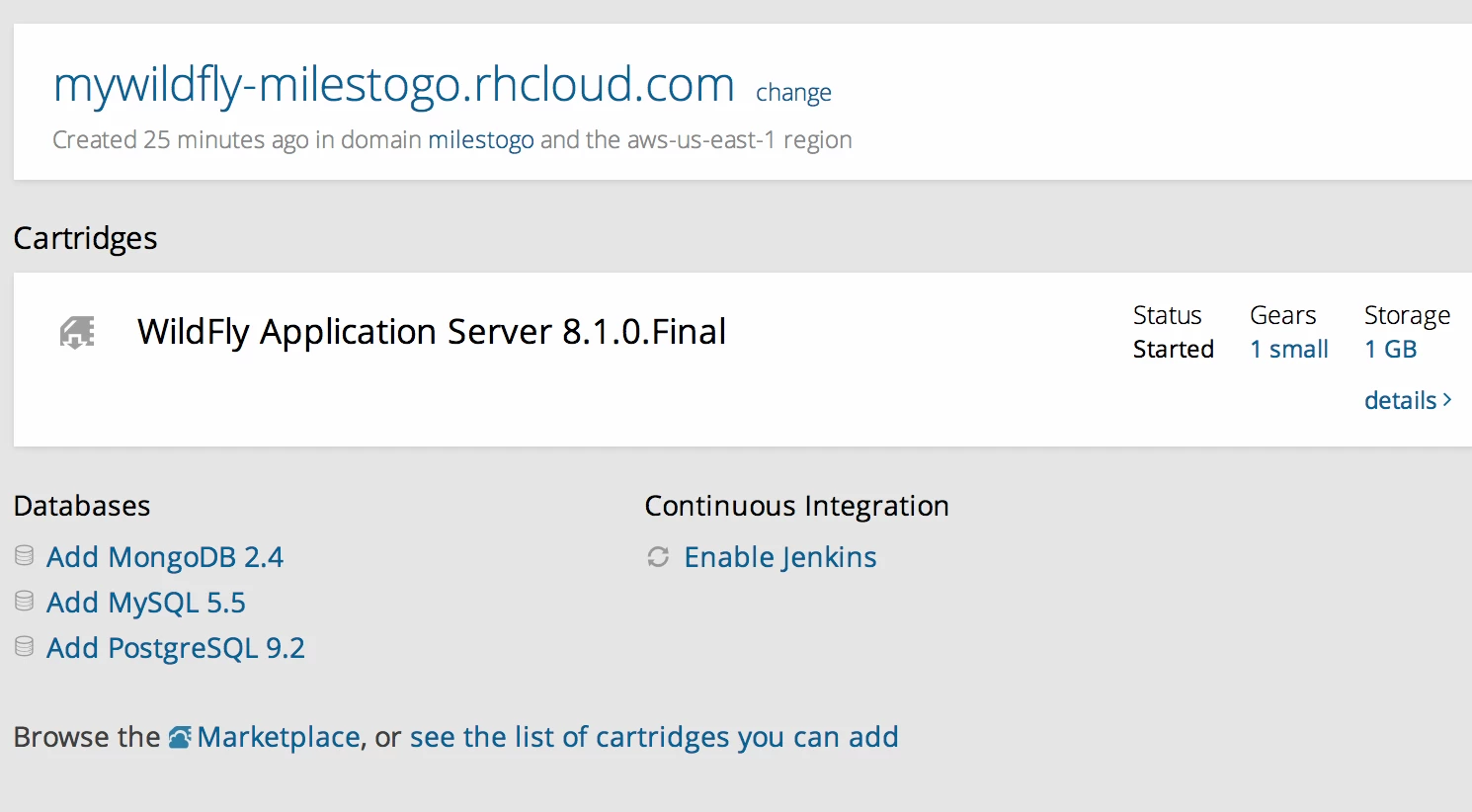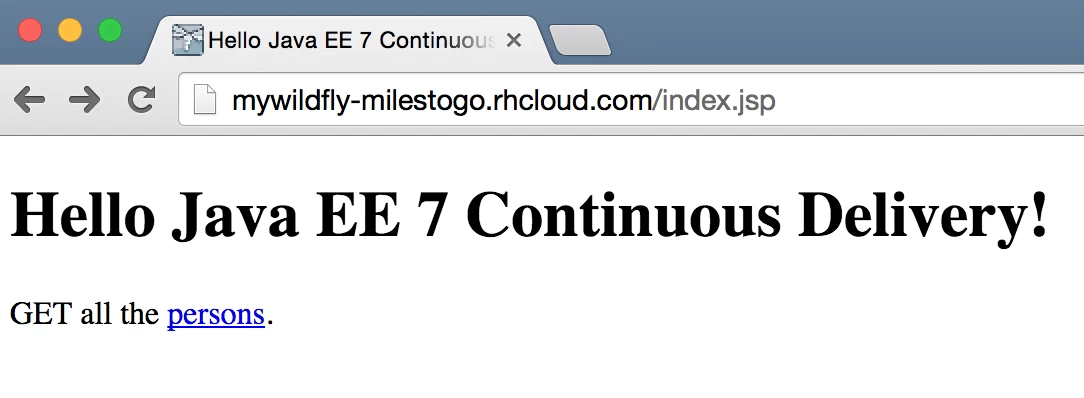Deployment Pipeline for Java EE 7 with WildFly, Arquillian, Jenkins, and OpenShift
Tech Tip #54 showed how to Arquillianate (Arquillianize ?) an existing Java EE project and run those tests in remote mode where WildFly is running on a known host and port. Tech Tip #55 showed how to run those tests when WildFly is running in OpenShift. Both of these tips used Maven profiles to separate the appropriate Arquillian dependencies in “pom.xml” and <container> configuration in “arquillian.xml” to define where WildFy is running and how to connect to it.
This tip will show how to configure Jenkins in OpenShift and invoke these tests from Jenkins. Lets see it in action first!
Configuration required to connect from Jenkins on OpenShift to a WildFly instance on OpenShift is similar to that required for connecting from local machine to WildFly on OpenShift. This configuration is specified in “arquillian.xml” and we can specify some parameters which can then be defined in Jenkins.
On a high level, here is what we’ll do:
- Use the code created in Tech Tip #54 and #55 and add configuration for Arquillian/Jenkins/OpenShift
- Enable Jenkins
- Create a new WildFly Test instance
- Configure Jenkins to run tests on the Test instance
- Push the application to Production only if tests pass on Test instance
Lets get started!
- Remove the existing boilerplate source code, only the
srcdirectory, from the WildFly git repo created in Tech Tip #55.010203040506070809101112131415161718mywildfly> gitrm-rf src/ pom.xmlrm'pom.xml'rm'src/main/java/.gitkeep'rm'src/main/resources/.gitkeep'rm'src/main/webapp/WEB-INF/web.xml'rm'src/main/webapp/images/jbosscorp_logo.png'rm'src/main/webapp/index.html'rm'src/main/webapp/snoop.jsp'mywildfly> git commit . -m"removing source and pom"[master 564b275] removingsourceand pom7 files changed, 647 deletions(-)delete mode 100644 pom.xmldelete mode 100644 src/main/java/.gitkeepdelete mode 100644 src/main/resources/.gitkeepdelete mode 100644 src/main/webapp/WEB-INF/web.xmldelete mode 100644 src/main/webapp/images/jbosscorp_logo.pngdelete mode 100644 src/main/webapp/index.htmldelete mode 100644 src/main/webapp/snoop.jsp - Set a new remote to javaee7-continuous-delivery repository:123456
mywildfly> git remote add javaee7 https://github.com/arun-gupta/javaee7-continuous-delivery.gitmywildfly> git remote -vjavaee7 https://github.com/arun-gupta/javaee7-continuous-delivery.git (fetch)javaee7 https://github.com/arun-gupta/javaee7-continuous-delivery.git (push)originssh://54699516ecb8d41cb8000016@mywildfly-milestogo.rhcloud.com/~/git/mywildfly.git/ (fetch)originssh://54699516ecb8d41cb8000016@mywildfly-milestogo.rhcloud.com/~/git/mywildfly.git/ (push) - Pull the code from new remote:01020304050607080910111213141516171819202122232425262728293031
mywildfly> git pull javaee7 masterwarning: no common commitsremote: Counting objects: 62,done.remote: Compressing objects: 100% (45/45),done.remote: Total 62 (delta 14), reused 53 (delta 5)Unpacking objects: 100% (62/62),done.From https://github.com/arun-gupta/javaee7-continuous-delivery* branch master -> FETCH_HEAD* [new branch] master -> javaee7/masterMerge made by the'recursive'strategy..gitignore | 6 +++README.asciidoc | 15 ++++++pom.xml | 197 +++++++++++++++++++++++++++++++++++++++++++++++++++++++++++++++++++++++src/main/java/org/javaee7/sample/MyApplication.java | 9 ++++src/main/java/org/javaee7/sample/Person.java | 31 ++++++++++++src/main/java/org/javaee7/sample/PersonDatabase.java | 39 ++++++++++++++src/main/java/org/javaee7/sample/PersonResource.java | 29 +++++++++++src/main/webapp/index.jsp | 13 +++++src/test/java/org/javaee7/sample/PersonTest.java | 77 ++++++++++++++++++++++++++++src/test/resources/arquillian.xml | 26 ++++++++++10 files changed, 442 insertions(+)create mode 100644 .gitignorecreate mode 100644 README.asciidoccreate mode 100644 pom.xmlcreate mode 100644 src/main/java/org/javaee7/sample/MyApplication.javacreate mode 100644 src/main/java/org/javaee7/sample/Person.javacreate mode 100644 src/main/java/org/javaee7/sample/PersonDatabase.javacreate mode 100644 src/main/java/org/javaee7/sample/PersonResource.javacreate mode 100644 src/main/webapp/index.jspcreate mode 100644 src/test/java/org/javaee7/sample/PersonTest.javacreate mode 100644 src/test/resources/arquillian.xmlThis will bring all the source code, include our REST endpoints, web pages, tests, updated “pom.xml” and “arquillian.xml”. The updated “pom.xml” has two new profiles.
0102030405060708091011121314151617181920212223242526272829303132333435363738394041<profile><id>openshift</id><build><plugins><plugin><groupid>org.apache.maven.plugins</groupid><artifactid>maven-war-plugin</artifactid><version>2.3</version><configuration><failonmissingwebxml>false</failonmissingwebxml><outputdirectory>deployments</outputdirectory><warname>ROOT</warname></configuration></plugin></plugins></build></profile><profile><id>jenkins-openshift</id><build><plugins><plugin><artifactid>maven-surefire-plugin</artifactid><version>2.14.1</version><configuration><systempropertyvariables><arquillian.launch>jenkins-openshift</arquillian.launch></systempropertyvariables></configuration></plugin></plugins></build><dependencies><dependency><groupid>org.jboss.arquillian.container</groupid><artifactid>arquillian-openshift</artifactid><version>1.0.0.Final-SNAPSHOT</version><scope>test</scope></dependency></dependencies></profile>Few points to observe here:
- “openshift” profile is used when building an application on OpenShift. This is where the application’s WAR file is created and deployed to WildFly.
- A new profile “jenkins-openshift” is added that will be used by the Jenkins instance (to be enabled shortly) in OpenShift to run tests.
- “arquillian-openshift” dependency is the same as used in Tech Tip #55 and allows to run Arquillian tests on a WildFly instance on OpenShift.
- This profile refers to “jenkins-openshift” container configuration that will be defined in “arquillian.xml”.
Updated “src/test/resources/arquillian.xml” has the following container:
0102030405060708091011<containerqualifier="jenkins-openshift"><configuration><propertyname="namespace">${env.ARQ_DOMAIN}</property><propertyname="application">${env.ARQ_APPLICATION}</property><propertyname="libraDomain">rhcloud.com</property><propertyname="sshUserName">${env.ARQ_SSH_USER_NAME}</property><propertyname="login">arungupta@redhat.com</property><propertyname="deploymentTimeoutInSeconds">300</property><propertyname="disableStrictHostChecking">true</property></configuration></container>This container configuration is similar to the one that was added in Tech Tip #55. The only difference here is that the domain name, application name, and the SSH user name are parametrized. The value of these properties is defined in the configuration of Jenkins instance and allows to run the test against a separate test node.
- Two more things need to be done before changes can be pushed to the remote repository. First is to create a WildFly Test instance which can be used to run the tests. This can be easily done as shown:01020304050607080910111213141516171819202122232425262728293031
workspaces> rhc app-create mywildflytest jboss-wildfly-8Application Options-------------------Domain: milestogoCartridges: jboss-wildfly-8Gear Size: defaultScaling: noCreating application'mywildflytest'... Artifacts deployed: ./ROOT.wardoneWildFly 8 administrator added. Pleasemakenote of these credentials:Username: adminITJt7YhPassword: yXP2mUd1w4_8run'rhc port-forward mywildflytest'to access the web admin area on port 9990.Waitingforyour DNS name to be available ...doneCloning into'mywildflytest'...Warning: Permanently added the RSA host keyforIP address'54.205.69.88'to the list of known hosts.Your application'mywildflytest'is now available.URL: http://mywildflytest-milestogo.rhcloud.com/SSH to: 546e3743ecb8d49ca9000014@mywildflytest-milestogo.rhcloud.comGit remote:ssh://546e3743ecb8d49ca9000014@mywildflytest-milestogo.rhcloud.com/~/git/mywildflytest.git/Cloned to:/Users/arungupta/workspaces/javaee7/mywildflytestRun'rhc show-app mywildflytest'formoredetails about your app.Note the domain here is
milestogo, application name ismywildflytest, and SSH user name is546e3743ecb8d49ca9000014. These will be passed to Arquillian for running the tests. - Second is to enable and configure Jenkins.In your OpenShift Console, pick the “mywildfly” application and click on “Enable Jenkins” link as shown below:
 Remember this is not your Test instance because all the source code lives on the instance created earlier.Provide the appropriate name, e.g. jenkins-milestogo.rhcloud.com in my case, and click on “Add Jenkins” button. This will provision a Jenkins instance, if not already there and also configure the project with a script to build and deploy the application. Note down the name and password credentials.
Remember this is not your Test instance because all the source code lives on the instance created earlier.Provide the appropriate name, e.g. jenkins-milestogo.rhcloud.com in my case, and click on “Add Jenkins” button. This will provision a Jenkins instance, if not already there and also configure the project with a script to build and deploy the application. Note down the name and password credentials. - Use the credentials to login to your Jenkins instance.Select the appropriate build, “mywildfly-build” in this case. Scroll down to the “Build” section and add the following script right after “# Run tests here” in the Execute Shell:1234
exportARQ_DOMAIN=milestogoexportARQ_SSH_USER_NAME=546e3743ecb8d49ca9000014exportARQ_APPLICATION=mywildflytestmvntest-Pjenkins-openshiftClick on “Save” to save the configuration. This will allow to run the Arquillian tests on the Test instance. If the tests pass then the app is deployed. If the tests fail, then none of the steps after that step are executed and so the app is not deployed.
- Lets push the changes to remote repo now:01020304050607080910111213141516171819
mywildfly> git pushCounting objects: 68,done.Delta compression using up to 8 threads.Compressing objects: 100% (49/49),done.Writing objects: 100% (61/61), 8.85 KiB | 0 bytes/s,done.Total 61 (delta 14), reused 0 (delta 0)remote: Executing Jenkins build.remote:remote: You can track your build at https://jenkins-milestogo.rhcloud.com/job/mywildfly-buildremote:remote: Waitingforbuild to schedule............................................................................................Doneremote: Waitingforjob to complete................................................................................................................................................................................................................................................................................................................................................................................................Doneremote: SUCCESSremote: New build has been deployed.remote: -------------------------remote: Git Post-Receive Result: successremote: Deployment completed with status: successTossh://546cef93ecb8d4ff37000003@mywildfly-milestogo.rhcloud.com/~/git/mywildfly.git/e8f6c61..e9ad206 master -> masterThe number of dots indicate the wait for a particular task and will most likely vary for different runs. And Jenkins console (jenkins-milestogo.rhcloud.com/job/mywildfly-build/1/console) shows the output as:
01020304050607080910111213141516171819202122232425262728293031323334353637383940414243444546474849-------------------------------------------------------T E S T S-------------------------------------------------------Running org.javaee7.sample.PersonTestNov 20, 2014 2:54:56 PM org.jboss.arquillian.container.openshift.OpenShiftContainer startINFO: Preparing Arquillian OpenShift container at http://mywildflytest-milestogo.rhcloud.comNov 20, 2014 2:55:48 PM org.jboss.arquillian.container.openshift.OpenShiftRepository pushINFO: Pushed to the remote repositoryssh://546e3743ecb8d49ca9000014@mywildflytest-milestogo.rhcloud.com/~/git/mywildflytest.git/Nov 20, 2014 2:56:37 PM org.jboss.arquillian.container.openshift.OpenShiftRepository pushINFO: Pushed to the remote repositoryssh://546e3743ecb8d49ca9000014@mywildflytest-milestogo.rhcloud.com/~/git/mywildflytest.git/Tests run: 2, Failures: 0, Errors: 0, Skipped: 0, Time elapsed: 103.056 secNov 20, 2014 2:56:37 PM org.jboss.arquillian.container.openshift.OpenShiftContainer stopINFO: Shutting down Arquillian OpenShift container at http://mywildflytest-milestogo.rhcloud.comResults :Tests run: 2, Failures: 0, Errors: 0, Skipped: 0[INFO] ------------------------------------------------------------------------[INFO] BUILD SUCCESS[INFO] ------------------------------------------------------------------------[INFO] Totaltime: 3:13.069s[INFO] Finished at: Thu Nov 20 14:57:34 EST 2014[INFO] Final Memory: 10M/101M[INFO] ------------------------------------------------------------------------+/usr/libexec/openshift/cartridges/jenkins/bin/git_ssh_wrapper.sh 546e36e5e0b8cd4e2a000007@mywildfly-milestogo.rhcloud.com'gear stop --conditional'Warning: Permanently added'mywildfly-milestogo.rhcloud.com,10.5.171.43'(RSA) to the list of known hosts.Stopping gear...Stopping wildfly cartSending SIGTERM to wildfly:418673 ...+rsync--delete-after -azO -e/usr/libexec/openshift/cartridges/jenkins/bin/git_ssh_wrapper.sh/var/lib/openshift/546e46304382ec3f29000012//.m2/'546e36e5e0b8cd4e2a000007@mywildfly-milestogo.rhcloud.com:~/.m2/'Warning: Permanently added'mywildfly-milestogo.rhcloud.com,10.5.171.43'(RSA) to the list of known hosts.+rsync--delete-after -azO -e/usr/libexec/openshift/cartridges/jenkins/bin/git_ssh_wrapper.sh/var/lib/openshift/546e46304382ec3f29000012/app-root/runtime/repo/deployments/'546e36e5e0b8cd4e2a000007@mywildfly-milestogo.rhcloud.com:${OPENSHIFT_REPO_DIR}deployments/'Warning: Permanently added'mywildfly-milestogo.rhcloud.com,10.5.171.43'(RSA) to the list of known hosts.+rsync--delete-after -azO -e/usr/libexec/openshift/cartridges/jenkins/bin/git_ssh_wrapper.sh/var/lib/openshift/546e46304382ec3f29000012/app-root/runtime/repo/.openshift/'546e36e5e0b8cd4e2a000007@mywildfly-milestogo.rhcloud.com:${OPENSHIFT_REPO_DIR}.openshift/'Warning: Permanently added'mywildfly-milestogo.rhcloud.com,10.5.171.43'(RSA) to the list of known hosts.+/usr/libexec/openshift/cartridges/jenkins/bin/git_ssh_wrapper.sh 546e36e5e0b8cd4e2a000007@mywildfly-milestogo.rhcloud.com'gear remotedeploy'Warning: Permanently added'mywildfly-milestogo.rhcloud.com,10.5.171.43'(RSA) to the list of known hosts.Preparing buildfordeploymentDeploymentidis dff28e58Activating deploymentDeploying WildFlyStarting wildfly cartFound 127.12.255.129:8080 listening portFound 127.12.255.129:9990 listening port/var/lib/openshift/546e36e5e0b8cd4e2a000007/wildfly/standalone/deployments/var/lib/openshift/546e36e5e0b8cd4e2a000007/wildfly/var/lib/openshift/546e36e5e0b8cd4e2a000007/wildflyCLIENT_MESSAGE: Artifacts deployed: ./ROOT.warArchiving artifactsFinished: SUCCESSLog files for Jenkins can be viewed as shown:
0102030405060708091011121314151617181920212223242526272829Nov 20, 2014 2:51:11 PM hudson.plugins.openshift.OpenShiftCloud provisionINFO: Provisioning new nodeforworkload = 2 and label = mywildfly-buildindomain milestogoNov 20, 2014 2:51:11 PM hudson.plugins.openshift.OpenShiftCloud getOpenShiftConnectionINFO: Initiating Java Client Service - ConfiguredforOpenShift Server https://openshift.redhat.comNov 20, 2014 2:51:11 PM com.openshift.internal.client.RestService requestINFO: Requesting GET with protocol 1.2 on https://openshift.redhat.com/broker/rest/apiNov 20, 2014 2:51:11 PM com.openshift.internal.client.RestService requestINFO: Requesting GET with protocol 1.2 on https://openshift.redhat.com/broker/rest/userNov 20, 2014 2:51:11 PM com.openshift.internal.client.RestService request. . .INFO: Checking availability of computer hudson.plugins.openshift.OpenShiftSlave@8ce21115Nov 20, 2014 2:53:35 PM com.openshift.internal.client.RestService requestINFO: Requesting GET with protocol 1.2 on https://openshift.redhat.com/broker/rest/domain/milestogo/application/mywildflybldr/gear_groupsNov 20, 2014 2:53:35 PM hudson.plugins.openshift.OpenShiftComputerLauncher launchINFO: Checking SSH access to application mywildflybldr-milestogo.rhcloud.comNov 20, 2014 2:53:35 PM hudson.plugins.openshift.OpenShiftComputerLauncher launchINFO: Connecting via SSH'546e46304382ec3f29000012''mywildflybldr-milestogo.rhcloud.com''/var/lib/openshift/546e393e5973ca0492000070/app-root/data/.ssh/jenkins_id_rsa'Nov 20, 2014 2:53:35 PM hudson.slaves.NodeProvisioner updateINFO: mywildfly-build provisioningE successfully completed. We have now 2 computer(s)Nov 20, 2014 2:53:35 PM hudson.plugins.openshift.OpenShiftComputerLauncher launchINFO: Connected via SSH.Nov 20, 2014 2:53:35 PM hudson.plugins.openshift.OpenShiftComputerLauncher launchINFO: Execmkdir-p $OPENSHIFT_DATA_DIR/jenkins&&cd$OPENSHIFT_DATA_DIR/jenkins&&rm-f slave.jar && wget -q --no-check-certificate https://jenkins-milestogo.rhcloud.com/jnlpJars/slave.jarNov 20, 2014 2:53:42 PM hudson.plugins.openshift.OpenShiftComputerLauncher launchINFO: Slave connected.Nov 20, 2014 2:58:24 PM hudson.model.Run executeINFO: mywildfly-build#1 main build action completed: SUCCESSThis shows the application was successfully deployed at mywildfly-milestogo.rhcloud.com/index.jsp and looks like as shown:

Now change “src/main/webapp/index.jsp” to show a different heading. And change “src/test/java/org/javaee7/sample/PersonTest.java” to make one of the tests fail. Doing “git commit” and “git push” shows the following results on command line:
01 02 03 04 05 06 07 08 09 10 11 12 13 14 15 16 17 18 19 20 21 22 23 24 25 26 27 28 29 | mywildfly> git commit . -m"breaking the test"[master ff2de09] breaking the test 2 files changed, 2 insertions(+), 2 deletions(-)mywildfly> git pushCounting objects: 23, done.Delta compression using up to 8 threads.Compressing objects: 100% (8/8), done.Writing objects: 100% (12/12), 771 bytes | 0 bytes/s, done.Total 12 (delta 5), reused 0 (delta 0)remote: Executing Jenkins build.remote: remote: You can track your build at https://jenkins-milestogo.rhcloud.com/job/mywildfly-buildremote: remote: Waiting for build to schedule.......Doneremote: Waiting for job to complete.....................................................................................................................................................................Doneremote: FAILEDremote: !!!!!!!!remote: Deployment Halted!remote: If the build failed before the deploy step, your previousremote: build is still running. Otherwise, your application may beremote: partially deployed or inaccessible.remote: Fix the build and try again.remote: !!!!!!!!remote: An error occurred executing 'gear postreceive' (exit code: 1)remote: Error message: CLIENT_ERROR: Failed to execute: 'control post-receive' for /var/lib/openshift/546e36e5e0b8cd4e2a000007/jenkins-clientremote: remote: For more details about the problem, try running the command again with the '--trace' option.To ssh://546e36e5e0b8cd4e2a000007@mywildfly-milestogo.rhcloud.com/~/git/mywildfly.git/ d618fad..ff2de09 master -> master |
The key statement to note is that deployment is halted after the tests are failing. And you can verify this by revisiting mywildfly-milestogo.rhcloud.com/index.jsp and check that the updated “index.jsp” is not visible.
In short, tests pass, website is updated. And tests fail, the website is not updated. So you’ve built a simple deployment pipeline for Java EE 7 using WildFly, OpenShift, Arquillian, and Jenkins!
| Reference: | Deployment Pipeline for Java EE 7 with WildFly, Arquillian, Jenkins, and OpenShift from our JCG partner Arun Gupta at the Miles to go 2.0 … blog. |







